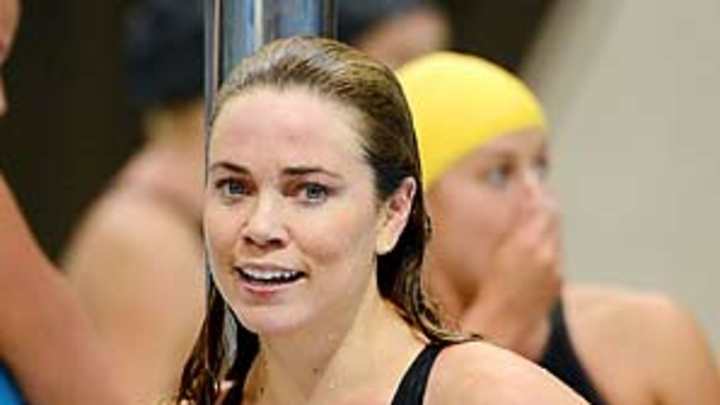Bittersweet London Olympics likely cement magical career for Coughlin


It can't be easy, watching from the stands as other swimmers put the finishing touch on your Olympic career. But that was the role Natalie Coughlin had to play Saturday night after she was left off the 4x100 free relay final despite turning in the fastest U.S. split in the morning preliminaries, a decision head women's coach Teri McKeever, who has been Coughlin's personal coach for the last 12 years, says was the hardest she has had to make as national team coach. As teammates Missy Franklin, Jessica Hardy, Lia Neal and Allison Schmitt came in third, behind Australia and the Netherlands, in an American record of 3:34.24, Coughlin, a three-time Olympian and team captain, stayed in the stands and cheered.
As she watched, Franklin, who had beaten Coughlin, her role model, in the 100 backstroke at U.S. Trials on her way to qualifying for seven Olympic events, got her welcome to Olympic competition by leading off the relay final with an impressive 53.52 split. "It was really weird having the first race a final," she said. "I'm not used to that, but it was so exciting, and we had so much fun."
GALLERY: Classic photos of Natalie Coughlin
Later Coughlin, 29, admitted she was disappointed she didn't get to join that fun. But even though she received her bronze medal in her athlete's village room rather than in front of thousands of fans at the Aquatic Centre at London's Olympic Park, it represented something rare, a feat of Olympic perfection that even Michael Phelps can't claim: 12 Olympic races contested, 12 medals won. That achievement puts Coughlin on the short list of the greatest American female swimmers in history. She may not be the most versatile; that title probably belongs to Tracy Caulkins, who is the only swimmer to set American records in every stroke. But Caulkins had the bad luck to hit her prime in the late '70s and early '80s, an era that limited her Olympic achievement because she couldn't make a living in the sport and because the U.S. boycotted the 1980 Games, for which she had qualified to swim five individual events. (Caulkins won three gold medals at the 1984 Olympics in the two IMs and the medley relay and then retired.)
Among American women who have had the opportunity to swim in multiple Olympics, Coughlin stands out. In Beijing, she became the first American female to win six medals in a single Olympics, "an incredible accomplishment," says teammate Dana Vollmer, that was overshadowed by Phelps's eight golds. Her bronze medal in the 4x100 free relay, ties the record shared by Jenny Thompson and Dara Torres. But neither Thompson nor Torres won gold in an individual event. Coughlin did it twice, becoming the first woman to win consecutive Olympic titles in the 100 backstroke. (She was also the first woman to break 1:00 in that event, and she set the world record four other times.) Three of Coughlin's other medals came in individual events, including bronzes in the 100 free (in Athens and Beijing) and the 200 IM (Beijing.) The other seven were in relays, which she has always loved so much McKeever thinks she sacrificed some personal medals for relay medals.
"People have told me I may never coach another swimmer like Natalie," says Teri McKeever. It's not just Coughlin's extraordinary Olympic success, or her endless enthusiasm for training -- "I love the day-to-day part of being a professional swimmer," she says -- or her myriad outside interests, which include cooking, gardening, photography and ballroom dancing (Coughlin survived five episodes of Dancing with the Stars in 2009.) "She has a relationship with the water that's just different," says McKeever. "I don't even know how to articulate it."
On a catamaran cruise during a Cal team training trip to Kona in January 2007, Coughlin and her teammates dropped into the water to intercept a pod of dolphins. "The dolphins would all go to Natalie and swim around her," says McKeever. "Some of the other swimmers said, 'Why won't they swim with me?' There's just something about her. She's not combative with the water. We'll all be catching waves in the ocean and I'll say to the other girls, 'See how Natalie is in the wave? Look how that looks different. You don't know why it looks different, it just does."
Coughlin may be in harmony with the water, but she does have a pugnacious side. "She's kind of like the girl next door when you see her, but when she puts her cap and goggles on, she's a pit bull," says Nick Folker, the Cal Aquatics strength coach. "She's not going to let you get away very easily."
That fierceness was on display Saturday morning. After failing to qualify for the team in any of her individual events, the 100 back, 100 fly or 100 free, at Olympic trials in June -- a disappointing result Coughlin attributed to possibly "overzealous" training -- the relay was Coughlin's only event in London. Swimming the third leg, Coughlin hit the water in third place and quickly overtook swimmers from Japan and Sweden to stake U.S. anchor Allison Schmitt to a .40 second lead. Schmitt held the lead to win the heat, and Coughlin's 53.93 split was the fastest on the team. But after crunching numbers and discussing other factors with her assistants, McKeever made the call to leave Coughlin off. "It was a mathematical (calculation)," said McKeever.
Though Coughlin hasn't decided yet whether she'll retire from the sport, Saturday morning was very likely her last Olympic race. It wasn't exactly the exit she wanted, but it won't effect her legacy. "I think the medal count stands for itself," says McKeever. "I'm incredibly proud of her. She raced with her heart and her passion and she gave it her best and that's all anybody she can do."
